The world’s most Louahvul newsletter goes out every Friday. Subscribe at louisville.com/newsletter.
5.21.2021, No. 55
⏱️ = 4-minute read (or so)
“Dada, at school I picked up eight cicadas with my real-life hand.” — Miles, my four-year-old
FIVE.
1. Last summer, for our annual Best of Louisville, I attempted to interview every single local high school senior in the 2020 class, and we ended up publishing words and thoughts from almost 400 of them. I’ve reached back out to them a few times since then, and did again this week with a few more questions, including:
The director of the CDC recently said, “If you are fully vaccinated, you can start doing the things that you had stopped doing because of the pandemic.” What’s one thing you had to stop doing that you’re excited to start doing again?
“Go out in public, see smiling faces.” — Kiaya, student at IUPUI
“Sitting down in restaurants.” — Sierra Waggoner, student at Purdue
“Shopping without a mask.” — Oksana, student at IUS
“Going to softball tournaments and parties. Now it’s all starting to come back, and it makes me so happy.” — Jordan Cunningham, student at Kentucky State University
“I’d like to have friends over indoors once they’re all back home from their colleges, but I don’t remember what people do when they’re indoors together. How do you spend time when you’re not talking six feet apart?” — Maggie Gediman, student at UC
“A more ‘normal’ college experience.” — Heather, student at U of L
“Not wearing masks at the gym on cardio machines.” — Annie Michael, student at the University of Richmond
“Vacation.” — Crume, student at JCTC
“Dinner and a movie with my family.” — Kennedy Alexander, student at Fisk University
“Family get-togethers.” — Aanika Garre, student at UC
“Seeing my eldest family members.” — Jordan Gaines, works at UPS
“Theme parks.” — Chloe Walrad, student at the University of Alabama
“Band! I have felt such a disconnect from myself without my community. Morehead has done a great job of maintaining as much normality as possible while staying safe, but I’m so excited to return to school and make music with my friends, and not be afraid of anyone getting sick. Also, I hope to get a Jeep Wrangler soon, ’cause it’s time. I’ve been waiting too long.” — Willow Harpole, student at Morehead
“Concerts. Not to have to wear a mask everywhere I go. To be able to hug people again!” — Lydia Holland, student at UC
“Hugs. Giving them, receiving them—all the hug-related things.” — Tori Minteer, student at WKU
If you could travel back in time one year and give yourself advice, what would you say?
“It’ll get better. I promise.” — Crume
“I would tell myself that it’s OK to feel all the feelings. I think I thought it was silly to be so upset over some of the things we missed. We all experienced loss in some way, whether it was loss of missed memories, trips, a family member, or maybe even feeling like you lost yourself. Now I know that my feelings were important. I didn’t need to ignore them.
“To my peers from Ballard, class of 2020: I hope you’re all doing well with whatever your post-high school plans were. If I had known March 13 was going to be our last day of high school, I would have asked everyone their plans, but since I didn’t, good luck with the rest of your life!” — Minteer
“I want to say that the pandemic is something that challenged everyone. It challenged school-aged kids all the way to folks in nursing homes. This past year has been a constant struggle, but I am grateful that it has built so many relationships and made people so much more grateful. We all had to go through this together, and because of that I have been able to relate to people I wouldn’t have before.” — Holland
“Be patient with yourself. Be patient with your friends. Everyone is struggling right now, and others might not remember that you are too. Also, buy stock in GameStop.” — Harpole
Will you describe (or share a photo that shows) something you took for granted before the pandemic?
“I used to complain about having to get up early for our color guard competitions. But since I didn’t get to participate in that last show, I feel bad for ever saying anything bad. I now know I will never get to perform with them ever again.” — Kiaya
“I’ll describe it: It’s a photo of me in my headphones, sitting in my senior study hall just before the pandemic. I look really happy. I always complained about little things in school that bothered me, but you never realize how much you’ll miss them when you no longer have them—graduating and losing them or losing them to the pandemic.” — Heather
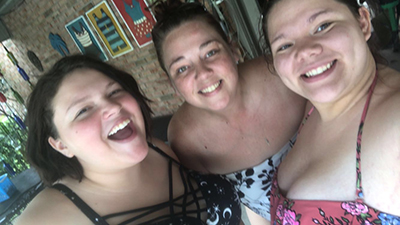
“Hanging out.” — Desiree
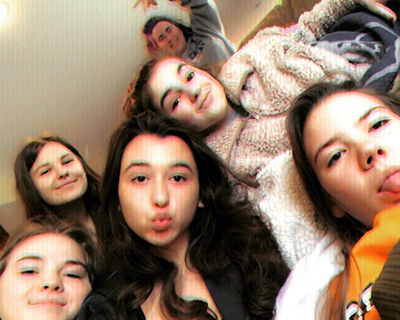
“After the pandemic began I didn’t get to see some of my close friends for a really long time.” — Olivia Snodgrass, student at U of L
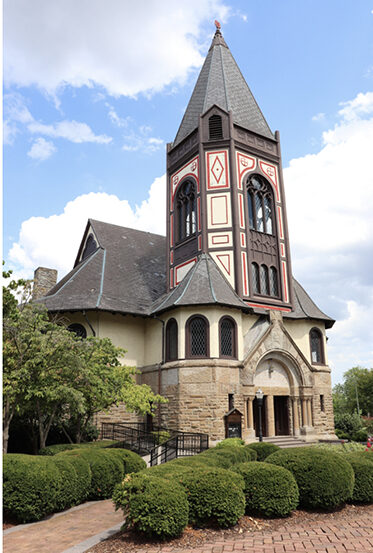
“I took being outside for granted—simply being surrounded by nature. This is a picture of the chapel on campus at Fisk, and it’s my favorite place to sit and relax. When COVID happened, I sat in my yard as often as I could, but I wish I could have been out at a softball game or eating outside at a restaurant.” — Alexander
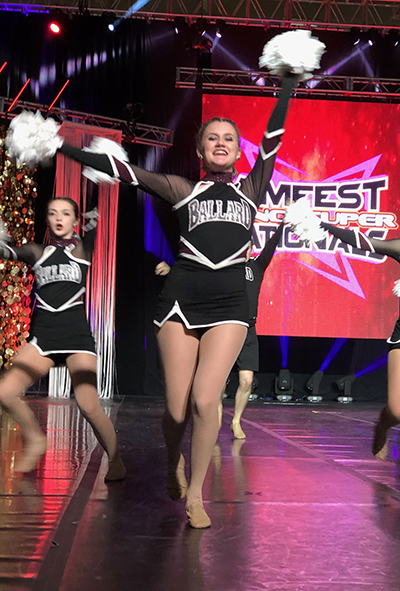
“I took dance for granted. This picture was one of my last times on a stage, which I didn’t know at the time. I’ve danced for almost 17 years now, but I can guarantee you that these next three years dancing for WKU, doing what I love, will not be taken for granted.” — Minteer
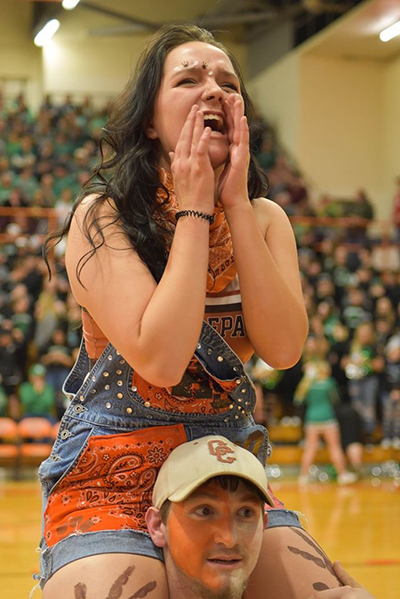
“Standing in those bleachers every weekend (at Crawford County High School, in Marengo, Indiana) was one thing I will forever want to re-live!” — Joclyn Ragland, works at Sun Tan City
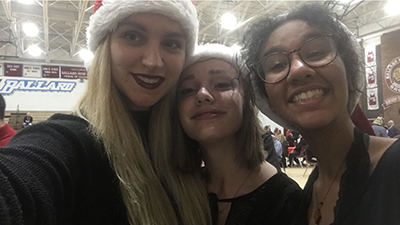
“Every year around May at Ballard we had a percussion ensemble concert, and the seniors would play a piece with our percussion director. I had looked forward to doing that since I was a freshman, but I never thought it would be taken away from me. In the music industry, they always say, ‘Play every concert like it’s your last.’ You hear that, you appreciate it, it resonates. But you don’t really apply it until it has happened to you.” — Harpole
2. Lester Holt took his NBC Nightly News on the road this week, on Tuesday broadcasting from Louisville. “A proud and historic city that hit a painful crossroads after the police shooting death of Breonna Taylor,” he said, adding that we’re “center to a national reckoning over policing” and “desperately in search of a way to heal.” He asked, “Can Louisville Metro PD”—now under a U.S. Department of Justice investigation—“perhaps emerge as a model for change?”
Holt mentioned the Ninth Street Divide, saying, “There’s no signage marking it, but it’s known to local residents as a physical and economic separation of west Louisville…from the rest of the city. A symbolic racial divide.”
He interviewed Breonna Taylor’s mother, Tamika Palmer, at the Speed Art Museum in front of the painted Taylor portrait that was a Vanity Fair cover. Palmer told him, “I want these officers to be charged with her murder, because that’s what it was.” Erika Shields, LMPD’s chief who was hired earlier this year, discussed the March 13, 2020, night when officers, executing a since-banned no-knock search warrant, shot and killed Taylor in her own home during a botched drug raid. Shields called Taylor’s death “sickening,” saying, “I have very real concerns about how the warrant was drawn up because I do think it’s a miscarriage of justice if you can be in your residence, shot and killed by law enforcement, and no one is held accountable for it.
“There are multiple practices that are broken. There are good people here. We have absolutely room for improvement. We have to do things differently. I’m going to get them there.”
Last June, hundreds of people stood on those very steps, listening to a live broadcast as the Metro Council voted to pass an ordinance banning no-knock warrants, called Breonna’s Law.
Here’s what Hannah said about the old cover:
“When I saw this picture — the cars, people walking downtown — I was immediately reminded of a Life Behind a Veil quote by (the late Louisville native and University of North Carolina) professor Blyden Jackson. He states, ‘Through a veil, I could perceive the forbidden city, the Louisville where white folks lived. It was the Louisville of the downtown hotels, the lower floors of the big movie houses, the high schools I read about in the daily newspapers, the restricted haunts I sometimes passed, like white restaurants and country clubs, the other side of windows in the banks, and of course the inner sanctums of offices where I could go only as a client or a menial custodian. On my side of the veil, everything was Black: the homes, the people, the churches, the schools, the Negro park with the Negro park police…I knew that there were two Louisvilles and…two Americas. I knew also which America was mine.’
“This magazine cover was made in 1953. It was not until 1963 that Louisville passed an open-accommodations ordinance fueled by a Nothing New For Easter campaign. This was a boycott of clothing stores by Black people that intended to apply economic pressure on store owners during the ordinarily busy Easter season. The protests were focused on the Fourth Street shopping district, where Black people were often discriminated against and harassed when attempting to make purchases or eat at certain restaurants.
“I am being asked to write about an image of a time in Louisville that I could have never experienced. That my father, who was born, raised, and died in Louisville, couldn’t participate in.
“In 2020, I stood outside this very same building and was teargassed in my old Kentucky home while protesting the death of Breonna Taylor. This photo is simply a reminder that Louisville will always remind Black people that we live in two Louisvilles and rarely, if ever, are Black people allowed to experience life beyond the veil.”
3. Each Monday, the new digital issue of the New Yorker is available when I wake up at 6 a.m., and this week I started reading “Can Horse Racing Survive?” basically the moment I opened my eyes. The author, William Finnegan, wrote, “The movement to abolish horse racing…has been gaining momentum, particularly on social media, for years…The Washington Post ran an editorial that advocated abolition now. ‘No other accepted sport exploits defenseless animals as gambling chips,’ the editors wrote. ‘No other accepted sport tolerates the cruelties that routinely result in the injury and death of these magnificent animals. The rot in horse racing goes deep. It is a sport that has outlived its time.’”
Legislation has passed that will create a national regulatory body for racing, which will begin work in July 2022. “For nearly a decade,” Finnegan wrote, “the biggest holdout in the industry was Churchill Downs, Inc. C.D.I., despite its ownership of the famous track, makes most of its money from gaming and casinos (outside Louisville), and its strategists apparently did not see a profit in cleaning up racing with the help of the federal government…What changed? My theory is that even the most hardheaded moneymen in racing began to worry.
“The hope is that the U.S. may…finally move closer to Europe and other venues in basic horse-racing safety.”
Racing, he wrote, is in “an identity crisis, and not just in California”—where dozens of horse deaths at Santa Anita made national headlines in 2019 before pandemic. “I heard it when I talked to horse people in Florida, Maryland, New York, and especially bluegrass Kentucky, the industry’s headquarters: the defensiveness, the virtue signaling, the pleas for understanding—but we love our horses. The opponents of racing seemed increasingly confident that it would soon go the way of circus elephants, dolphin shows, dog racing, all the discredited animal entertainments.”
I haven’t been able to stop thinking about the cynical line “but we love our horses” because in the barns on the backside of Churchill Downs I have seen, year after year, workers who do love these animals. I was reminded of a quote from almost exactly a year ago—May 22, 2020—after a two-month closure at Churchill due to the pandemic. Merlin Cano, a 19-year-old worker on the backside who came to the U.S. from Guatemala in 2011, was talking to one of our reporters about COVID specifically, though now what she said makes me think of even bigger threats to racing. “I get here at 4:50 a.m. We have to be wearing a mask all the time. We get a different paper bracelet every day. Someone checks our temperature in the morning, and they put on a different color bracelet every day so that they know your temperature was taken already,” Cano said. “It feels good to be back with the horses. When you’re with the horses you kind of forget what’s going on on the outside
“I worry about if they were to close it all down again due to the virus. That would be almost 1,000 jobless families who are immigrants, who have kids, who probably haven’t worked anywhere but this.”
4. For a story about a nationwide labor shortage and the “battle for workers,” Kristen Schweizer, the director of operations for the Louisville-based staffing company Malone Workforce Solutions, told Business First that she’s seeing more “passive” than active job candidates, though recently she has noticed a trend in the other direction. “The uptick signals to me, potentially, that people are realizing the (governmental) benefits they are receiving right now are not a long-term thing,” she said.
Her quote reminded me of another Biz First piece, this one from early last month, about a “staffing crisis” at local restaurants. Paula Barmore, who co-owns Anoosh Bistro and Noosh Nosh, said, “Pre-pandemic, it was challenging to find good people, but post-pandemic it’s almost impossible…It is mindboggling to think that we’ve made it through the worst of times in the pandemic and now we’re just struggling to make a living and have the staff we need to open the doors every day…Doesn’t matter if it’s fine dining or casual or fast service — we’re all in the same boat.”
One person in the restaurant scene told me it’s not uncommon to see Louisville restaurants offer $15 or $20 an hour, with signing bonuses. (By the way, can we have an honest discussion about minimum wage in Kentucky? Without, I dunno, Rand Paul saying, “And the people who lose their jobs first when you hike up the minimum wage are Black teenagers, so, you know, why does Joe Biden hate Black teenagers?”)
Last weekend, we went for burgers at 80/20 @ Kaelin’s, and when we sat down the server said, “It might take a little longer than usual because we’re understaffed.” The apologetic owner kept checking on us while we waited, brought us some fries, dropped off some pretzel bread with beer cheese.
“It’s really no problem,” I said.
“But it is though,” he replied.
5. And now a playlist of songs from the 2020 grads who answered: What song captures your mood right now?
“‘So Done,’ by the Kid Laroi.” — Cunningham
“‘Dreams and Nightmares,’ by Meek Mill.” — Gaines
“‘Young Dumb & Broke,’ by Khalid. These words truly describe my life right now.” — Sammy Krimple, works at Urban Outfitters
“‘Crazy Train,’ by Ozzy Osbourne. Because not being able to be normal is driving me insane.” — Waggoner
“‘older now (it hurts),’ by Field Medic. ‘Tried to quell my fears/but I got mugged and stayed afraid.’” — Gediman
“‘Waving Through a Window’ from Dear Evan Hansen. Everything right now is horrendous, I’m losing close connections with my friends—but there’s a light at the end of the tunnel.” — Heather
“‘Youth,’ by Daughter. It’s about loss, but it’s also a reminder of hope in the end. My college dance team danced to that song for nationals this season, and we all connected to it in different ways. I lost my grandpa last summer, and dancing and listening to that song helped me.” — Minteer
“‘My House,’ by Flo Rida.” — Cory Nevitt, works at UPS
“‘Down Under,’ by Men At Work.” — Samantha Flores, Ivy Tech student
“‘American Honey,’ by Current Joys. The feeling of going back to a sense of ‘normalcy’ is bittersweet. The world will actually never be the same.” — Crume
“‘Summer Paradise,’ by Simple Plan featuring MKTO.” — Garre
“‘Here Comes the Sun,’ by the Beatles. Summer is coming. And I’m happy about that.” — Michael
“‘Magic in the Hamptons,’ by Social House featuring Lil Yachty. A feel-good song for the summer. Get up and dance.” — Snodgrass
“‘Just Fine,’ by Mary J Bilge. It’s upbeat and gives me the motivation to smile even on my worst days.” — Alexander
“‘SUPERBLOOM,’ by MisterWives. It talks about coming out of a hard, enduring experience and blooming into the best version of yourself.” — Holland
“‘Kids,’ by the HillBenders. It’s a cover of a nostalgic MGMT song. Kinda bluegrass. Morehead does that to you.” — Harpole
“‘Jump Right In,’ by Zac Brown Band. Everything is getting back to normal, so I’m ready to jump right in. Plus, it has a summery, windows-rolled-down vibe.” — Maria Popson, U of L student
“‘Summer of ’69,’ by Bryan Adams. I just can’t wait to have a normal summer again.” — Ragland
A huge thank you, thank you, THANK. YOU. and a slow clap to every partner whose support made our newest issue possible:
Audi Louisville, Blue Grass MOTORSPORT, Catholic Education Foundation, the Christina Lee Brown Envirome Institute at U of L, DDW: the Color House, Derby Dinner Playhouse, Design Builders Inc., Gilda’s Club, Integrity HR, Kentucky Select Properties, Land Rover Louisville, LG&E, Louisville Public Media, Louisville Zoo, Nanz & Kraft, One Blue Wall, Phocus, Speed Art Museum, Waterfront Park.
👏…👏 …👏👏…👏👏👏…👏 👏👏👏👏👏👏
OH!
A little something from the LouMag archive.
All this summer talk reminded me of this cover from 1979.

In June 2016, for a Louisville Magazine back page “exposing our history of poor judgement” on the cover, Anne Marshall, who was senior writer at the time, wrote, “‘Swimmertime’ is an awful play on words. And is that model naked? If so, that makes this cover a bit cooler.”
TOO…
Miles also said, “And, Dada, I have one cicada in my pocket. He’s not dead.”
Josh Moss
editor, Louisville Magazine
josh@louisville.com
Read past newsletters here.